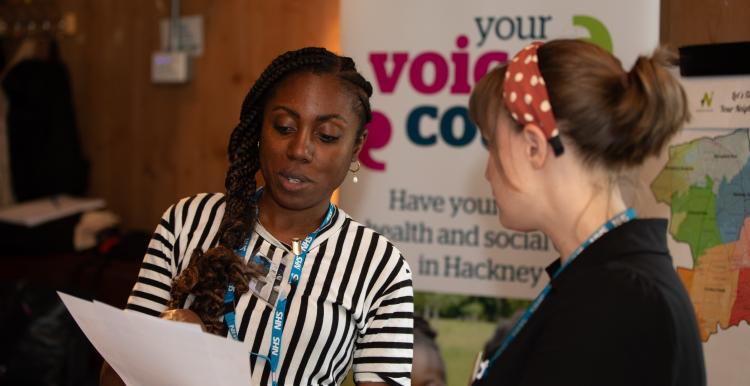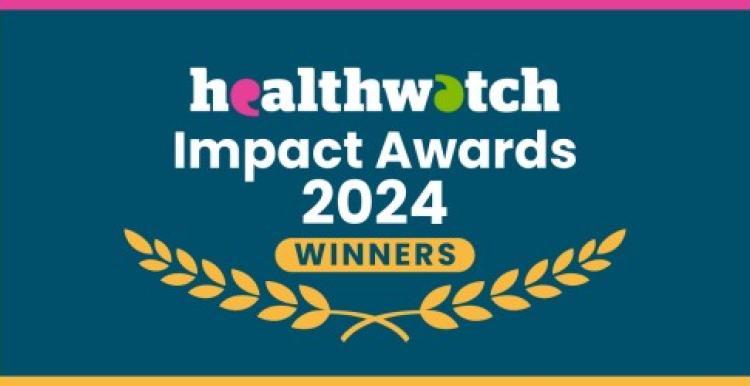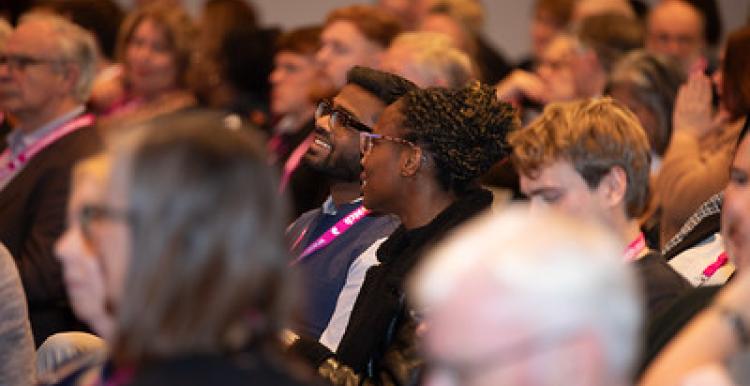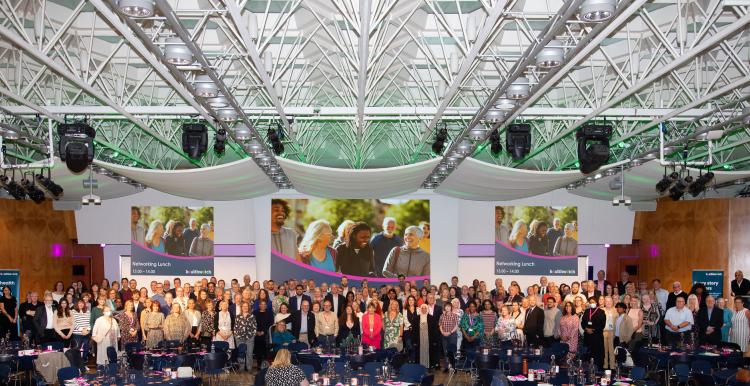Your Theory of Change identifies the long-term outcomes you seek in a particular area of work. But how will you know if you achieve these? What measures might you use to evidence your success and prove your longer-term impact? What strength of claims could you make about your Healthwatch’s contribution?
Demonstrating impact
There are approximately 14 million disabled people in the UK. This workshop will help you gain awareness about disability and how disability can impact the health outcomes and experiences of people accessing health and social care services. This awareness is an important part of supporting the communities we serve.
You will have the opportunity to ask questions and discuss how this relates to your own work.
This meeting will help you to understand how to apply for funding opportunities and take part in Healthwatch England policy research projects.
You will also have the opportunity to ask questions and receive support from your colleagues in the network and our friendly Research and Insight team.
Type of event
Network meeting – presentations with discussion and Q&A in a friendly and informal setting.
This event will help you understand how you can best highlight your achievements in your annual report and help you understand where to start and how to structure your case studies.
Type of event
This is a small group session and will involve audience participation in break out room with discussion and tasks as well as a demonstration and presentation from the hosts.
Joining in with your camera on will be appreciated
This session will take you through the basics of good media relations, including how to develop and sell your story and to come across well in an interview.
Type of event
Interactive learning session to large audience with time to ask questions.
Who is this event for?
This session is for anyone involved in communications or media relations for their local Healthwatch.
What you will learn?
In this session you will:
Annual report template 2024 - 25

On this page you'll find information on, and links to:
Annual Report template
It's a legal requirement for your local Healthwatch to produce an annual report by the end of June. To help you do this, we have provided a template, which is available in PowerPoint and InDesign formats on the Communications Centre (Brandstencil).
The template uses our latest brand guidelines and includes guidance on how to complete your report, what to change, and what to include.
Please note you will need to be logged in to see the resources on the Communications Centre. There is one account per local Healthwatch. If you are having problems accessing your account, please email hub@healthwatch.co.uk.
Photography and icons
Images
It's great if you personalise the report with local photography. However, we are aware that many local Healthwatch struggle to source photography and do not have the budget to purchase many stock images. Check out our Flickr albums for a range of high-quality photos that are free for you to use.
Icons
As part of our brand identity we have a collection of simple line icons. These are used in this year's template, but should you wish to change any of them you can access the full suite here. We advise using the navy icons throughout, unless there is a dark background, in which case you should use the white icons.
Training and support
We want to help you produce the best report you can, so we have been running a series of webinars to help make the process easy and straightforward for you.
How to use the annual report template - recording
This recorded session will help you understand how to use the PowerPoint template, including changing pictures, updating text, and adding or deleting slides.
How to write for your annual report
These interactive sessions will show you how you can best highlight your achievements from the last year, how to write great case studies and how to demonstrate the difference your work made.
Tuesday 20 May | 10am - 11:30am
What is the deadline?
The deadline for your report is 30 June 2025.
Who do I send my annual report to?
Once you have published your report, you need to send it to:
- Healthwatch England (using this form)
- Your local Care Quality Commission contacts
- NHS England (Email England.healthwatchannualreport@nhs.net)
- Senior Integrated Care System leaders in your area
- The Overview and Scrutiny Committee of your local authority
- The local authority that commissions your service
How do I submit my report?
To submit your report, please upload the finished document through our website form linked to below.
Additional resources
So you've written and submitted your annual report – what next? We want to help you get the most out of your annual report content so we've put together guidance to help you do that.
What else can I do with my annual report content?
Once you have finished your annual report, you have loads of great content on your impact over the last year. Check out our tips to make the most of your annual report content across your digital channels.
How to make the most of your annual report content | Healthwatch Network
Outstanding work leads to first joint Impact Award win

Two projects have been awarded the 2024 Healthwatch Impact Award for their exceptional work in using local people’s experiences to improve care.
The annual awards ceremony saw teams from both Healthwatch Milton Keynes and Healthwatch in Sussex take away top honours for their work.
With 18 shortlisted projects from across England, there were plenty of strong entries for this year’s Impact Award.
The award celebrates the difference local people make to health and social care services by sharing their feedback with our staff and volunteers.
The projects submitted ranged from an initiative to improve access to social care to work to ensure more people get health checks.
The quality of the work was so high that the judging panel named two winners for the first time.
Joint winners
Better mental health care for women in Milton Keynes
When a CQC inspection found issues with the relationship between patients and staff on the Willow Ward, an acute mental health care unit in Milton Keynes, Healthwatch Milton Keynes took action.
Speaking to 400 people, they learned that patients felt staff attitudes were poor. There wasn’t enough communication about discharge, and patients didn’t feel treated as individuals.
This feedback meant Healthwatch Milton Keynes could make recommendations that led to staff training on trauma-informed care, and the introduction of a Peer Support Worker to help with discharge.
These changes have improved relationships between staff and patients and made patients feel less anxious about the discharge process. Find out more about the project here.
Improved patient transport in Sussex
After local Healthwatch across Sussex heard about problems with Non-Emergency Patient Transport Services, they worked at a regional level to improve the situation for patients. Healthwatch East Sussex, Healthwatch West Sussex, and Healthwatch Brighton & Hove gathered feedback from the community and made recommendations.
New plans for patient transport services in the region reflected their recommendations. This work also helped improve patient communications, give clearer guidance about who is eligible for the service, and provide better information on alternative transport services. Read more about it here.
Praising the winners, chief judge and Chair of Healthwatch England Professor David Croisdale-Appleby, said:
“Your work shows exactly why listening to local people interviewed in their community is the key to understanding how best to design and deliver the most appropriate and relevant health and social care services.
"Because your communities have trusted you with their experiences, not only have you helped services identify problems, but you’ve also enabled them to provide better support through the understanding your research provides.”
Commendations for a further six Healthwatch
Healthwatch highly commended for their work were:
- Healthwatch Herefordshire, whose work to understand and address barriers preventing people with learning disabilities from having annual health checks led to greater awareness and better access among local people.
- Healthwatch Barking and Dagenham, for research into why South Asian residents are not taking up social care support. This led to the council working with community groups to tackle misconceptions and make information more accessible to those whose first language is not English.
- Healthwatch Liverpool, who raised awareness among healthcare professionals about how to better support people who have experienced sexual trauma. They also secured funding to provide trauma cards to patients so they can feel more confident when attending appointments.
Healthwatch commended for their work were:
- Healthwatch North Yorkshire: Adults experiencing mental health issues can now access support that’s right for them through First Contact Mental Health Practitioners (FCMHP) in GP practices across North Yorkshire after speaking up about their experiences of accessing mental health support.
- Healthwatch York: Adults entering the Autism and Attention deficit hyperactivity disorder (ADHD) diagnosis pathway will experience a more straightforward journey and access to better support following people's feedback about their frustrations with changes to the diagnostic pathway that made getting a diagnosis or the right support difficult.
- Healthwatch Dudley: Those with additional communication needs and people without a fixed address can now access the GP services they need after speaking up about their challenges accessing care.
Recognising the brilliant work of all the nominees, Professor David Croisdale-Appleby said:
“You exemplify the best of Healthwatch. Your work demonstrates the very real difference Healthwatch makes to health and care every day – whether that's finding out what people want, helping people access support, or working with services to improve the care they provide.
"You and your communities should be proud of what you do, and the difference it makes to the quality of people’s lives.”
The other Healthwatch shortlisted were:
- Healthwatch Bolton: Women experiencing perimenopause and menopause can now access the support and care they need after voicing concerns about a lack of Hormone Replacement Therapy (HRT) information and poor attitudes of healthcare professionals.
- Healthwatch Brighton and Hove: Outpatients, carers, friends, and visitors to hospitals in Brighton and Hove can now expect a better welcome and communications about outpatients’ appointments after a lack of clear communication was identified as a barrier to positive patient experiences.
- Healthwatch County Durham: Farmers' access to healthcare has improved with the introduction of a pioneering new initiative offering walk-in clinics. This means they can now attend health checks at a time that suits them.
- Healthwatch Derbyshire: Following the development of an information pack, patients, their families, and carers will benefit from a significantly improved hospital discharge experience. Their voices are also feeding directly into ongoing service improvements across all discharge pathways in Derbyshire. And there is an increased focusing on providing better communication, clearer information, stronger coordination, and more personalised support.
- Healthwatch Gloucestershire: People with care needs and their unpaid carers have become Experts through Experience, highlighting issues around unmet needs and, directly influencing Adult Social Care services to ensure they meet the care needs of service users.
- Healthwatch Hampshire, Isle of Wight, Portsmouth and Southampton: People with additional communications needs can now access support that meets their needs after a campaign to raise awareness of the Accessible Information Standard (AIS) and efforts to educate those who need it on their rights to accessible information about their healthcare.
- Healthwatch Kingston Upon Hull: People experiencing homelessness now have improved access to Yorkshire Ambulance Services (YAS) after speaking up about their care needs.
- Healthwatch North and West Northamptonshire: People with Autism or Attention deficit hyperactivity disorder (ADHD), and their families or carers have improved the pathway to diagnosis for those waiting after sharing their concerns around diagnosis and what support is available.
- Healthwatch Surrey: Patients and healthcare professionals in Surrey are now more aware of the importance of feedback and the difference it can make to services and overall patient experiences.
- Healthwatch Sunderland: Bangladeshi women can more easily access GP services after speaking up about the difficulties they had with booking systems and securing appointments. After listening to their experiences GP practices now understand some of the barriers this community may face and have made improvements to make it easier for them to use these systems.
Reflecting on the impact of your annual reports: How you are making a difference

This year, my team and I thoroughly enjoyed reading through your annual reports. It’s such a rewarding and motivating experience to see the difference you're making for communities across England. From influencing local plans and strategies to ensuring public communications are accessible and understandable, revising service delivery for better effectiveness, and facilitating people’s involvement in service design—you’re making a tangible impact. It’s clear how much your work means for the experience and health outcomes of local people.
There’s a strong consensus across the Healthwatch network that demonstrating impact is essential to maintaining support and securing funding. This priority has been reinforced in our conversations with local authority commissioners and other key stakeholders—demonstrating outcomes is a clear expectation we've incorporated into the new template contract specification we are developing at their request. Highlighting impact is also vital for making the case for Healthwatch’s future sustainability and growth. That’s why we’ve made impact a core service value and placed greater emphasis on outcomes in our updated annual report template.
Next steps
At Healthwatch England, we’re tasked with forming an opinion on the effectiveness of local services. The outcomes achieved by each local Healthwatch are key proxy indicators that inform our reporting on the State of the Network – the picture of the effectiveness of Healthwatch. We look forward to showcasing examples of Healthwatch outcomes across health and care, particularly those addressing inequalities, including our forthcoming National Awards 2024.
In just two years, there’s been a remarkable shift towards outcomes-focused reporting. In 2021/22, only 40% of annual reports demonstrated a good level of outcomes reporting. This year, we saw that figure rise to 80%! The progress over the past year alone is impressive: between the 2022/23 and 2023/24 reports, a third of the network significantly increased their focus on outcomes reporting, with another third showing a marked improvement.
Moreover, the majority of annual reports that communicated outcomes highlighted changes with a clear impact on reducing health inequalities—a tremendous shift in focus that the network has achieved in a few short years.
There’s still a little way to go for some Healthwatch to communicate achievements as effectively as the front-runners. However, we’re confident that in most cases, it’s a matter of following up on completed work or refining how the story is told about what’s achieved for local residents.
For the Healthwatch that may be struggling with outcomes reporting, we understand there can be various challenges. It might also be that we’re not fully capturing the real picture from the annual reports alone. That’s why we’ll be reaching out to better understand your experiences locally and explore how we can provide further support.
We hope you too have noticed the positive impact that refining your approach to communicating outcomes has had on local support and engagement. We’re committed to helping Healthwatch improve individually and as a network, and have developed a suite of resources to support the network, all accessible from one page on the network site: Impact Resources. This includes early work to set out the domains of outcomes – not just service improvements, but all the areas where Healthwatch can achieve impact such as helping shape strategies and plans and facilitating effective co-creation.
Thank you for your ongoing dedication and for sharing the incredible work you do. It’s inspiring to see the progress made and the growing focus on outcomes that truly make a difference for local communities. Together, we are building a stronger, more impactful Healthwatch network.
How do we articulate the outcomes we achieve?
Impact Programme Manager Jon Turner gives an update on this area of work and the next steps in creating resources for you to use.

From listening to Healthwatch, we’re keen to ensure we help the network capture and describe all the outcomes achieved, as well as where and how this happens. Sometimes, the focus can be mainly on the ‘service change’ outcomes, which can be easier to describe, but we know this doesn’t reflect the breadth of statutory activity.
This document details the current version of our Outcomes Categories model. It summarises our combined thinking so far, based on initial conversations with fifteen lead officers, reflection on the types of outcomes and impact found in annual reports and elsewhere, and following a more recent set of discussions with several local Healthwatch leaders.
My thanks for invaluable input most recently go to Healthwatch Derby, Healthwatch Richmond upon Thames, Healthwatch Southend, Healthwatch Warwickshire, Healthwatch Essex, Healthwatch Newcastle and Gateshead, Healthwatch Southwark, Healthwatch Rotherham, Healthwatch Liverpool, and Healthwatch Milton Keynes.
Our thinking is that this work will be used to:
- Make sure we’re all telling the best story about each outcome category and enhance our overall narrative about the value of listening and of what Healthwatch offers.
- Help ensure that funders and other stakeholders recognise the breadth of Healthwatch impact.
- Ensure what Healthwatch achieve through ‘holding to account’ is better understood, considering the responsibilities covered in the Holding to Account Toolkit.
- Help us all consider any relationship between the particular categories where outcomes are achieved, the approaches to influencing needed to do that, and the level of resources it takes.
- More clearly describe the two-way relationship between insight and impact at local and national levels.
- Strengthen our overall picture of Healthwatch impact to inform our support offer.
But this is by no means the finished product. There was broad agreement during our most recent discussions that this model in its current form is interesting, thought-provoking, and useful to generate reflection and team discussions – but too much to easily digest in one sitting. As one Healthwatch leader put it: “How will we operationalise it?”
So, that’s the challenge we’ll now move on to. Over the next few months, the task is to find a format that turns this into a usable resource that does, in fact, achieve the aims listed above. Please do share any observations and ideas with me on any part of this.
For further information about this or the wider impact programme then please feel free to contact jon.turner@healthwatch.co.uk
Downloads
Strengthening our future: preparing for change and building on our impact

At last year's conference, I outlined a key strategic objective: to address the sustainability and variation within the Healthwatch network—something many of you highlighted when I first joined Healthwatch England.
With a general election on the horizon, we knew we had to be ready to make our case for change and seize any potential legislative opportunities.
Since then, these discussions have been both necessary and, at times, challenging. You've shared firmly held views rooted in your conviction and experience – including those at odds with the proposal preferred by our National Committee with Healthwatch England as commissioner, referenced in National Committee member Jane Laughton's blog.
We all agree on the scale of our challenges: unsustainable, inequitable funding and negative variation, often driven by factors beyond individual Healthwatch control, such as commissioning.
Doing nothing is not an option.
Without change, some Healthwatch will become unviable, leaving communities without a public champion and eroding the collective influence we've worked hard to build.
However, we didn't foretell the Dash Review, which now examines local Healthwatch and Healthwatch England alongside patient safety organisations.
These tough conversations have prepared us for any changes from the review. We are committed to supporting it, enabling local Healthwatch to have a voice in the process and putting forward our case for change.
Your views have been crucial in shaping our thinking. We've heard about the critical role Healthwatch plays in your communities, the importance of local decision-making and the deep relationships you hold with local people, groups and stakeholders.
The case for local Healthwatch in every area has been heard. There's consensus that we must maintain and strengthen relationships with local authorities while carefully keeping what's working well in certain areas. There is much more work to be done on what this looks like.
There is also the opportunity to modernise our infrastructure and embrace emerging technologies. By doing so, we can free Healthwatch teams from outdated systems, allowing you to focus on your core mission.
Is the proposal fully developed? No, it remains a high-level proposal as part of our broader case for change.
In any case, we are committed to presenting all the models we've explored and their respective advantages and risks. Ultimately, if we succeed in making our case, it will be up to government decision-makers to shape our future, including decisions on our funding. A full implementation and transition plan will be required.
I'm confident in the strength of our case for change.
Healthwatch provides significant value, with even greater untapped potential. Reading your annual reports and hearing about your impact on my visits to your communities has been inspiring.
From your insight into driving national change to individual Healthwatch contributing to select committees and collaborating to influence ICB decision-making, we achieve far more than our size suggests.
For just a penny per person per week, we deliver incredible value—and we know we can achieve even more.
In the wake of the Darzi Review, much attention has focused on fixing the NHS. We’re poised to play our part in helping to shape the 10-Year Plan for the NHS with the involvement of local Healthwatch.
We believe social care needs the same focus—a message we will continue to champion. As the public's health and care champion, Healthwatch must be central to any revitalised system—where lived experiences, particularly from those facing inequalities, drive improvement and accountability.
This is key to ensuring a more equitable system with better outcomes for all.
I look forward to seeing you at the conference, where we will reflect on our achievements, discuss the challenges ahead, and continue working together to build a more sustainable and impactful future for Healthwatch.
